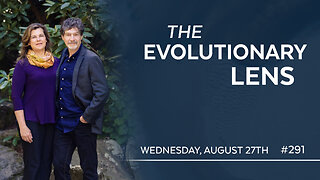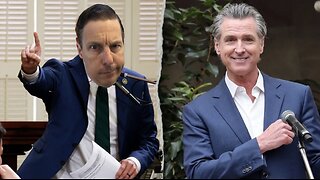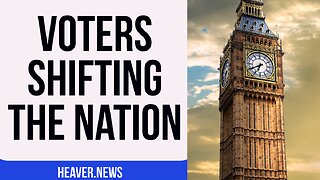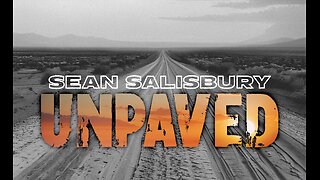Premium Only Content

Absolute Morality
Is morality absolute, or is it subjective? In other words, does it constantly change with the time and place, or is it set in stone, like, say, the Ten Commandments?
I believe the answer to this question is a big factor behind the polarization of our culture in America – better known as the “culture wars”. But it’s not true that only conservatives believe morality is absolute. Progressives are also known for their rigid conformity to a certain set of politically correct beliefs and values, which is now known as being “woke”. They might have a hard time admitting it, but they often have a more absolute view of morality than conservatives!
The difference, I think, is that conservatives believe in past expressions of moral law, such as the Ten Commandments or the Bill of Rights. As a result, they know by experience that we haven’t lived up to these ideals and would generally blame our flawed human nature and immoral choices for this failure. Thus, the emphasis on law and order and personal responsibility.
Progressives, on the other hand, believe in future expressions of absolute morality that might be achieved in a utopian society, and seem to have great faith in human nature and progress to reach them. Thus, the emphasis on a more idealistic view of human nature and more blame for our individual failures on immoral societal systems and corrupt governments.
I’m starting to realize that as Christians, we do hold to absolute morality like the Ten Commandments or Jesus’ Sermon on the Mount, but we need to decide if the best expressions of those moral absolutes have already occurred in the past or are something we need to work toward in the future when it comes to politics and individual issues.
We need to be “free agents” politically, and the best way to be unified or at least understanding and not demonizing one another is in the free exchange of ideas that occurs in classical liberalism. We have to learn to listen and understand the views of others and weigh them with our own, with the goal of determining which positions are most in line with biblical principles and values.
It was the nature of morality that made up a large part of a recent conversation I had with a young man named Corban, who grew up in a Christian household in the Bible Belt. For many like him, a rejection of strict traditional rules feels more a move toward subjective morality, and it was his supposed rejection of absolute morality that also drove him away from strict belief in the God of Christianity.
Corban has come to the belief that morality should be determined by whether or not a particular action brings harm to others. He agreed that it would be God to whom we are generally accountable for our actions, but disagreed that God had the right to tell us what we should or should not do specifically.
His “cause no harm” belief is like other general maxims that are attractive because they apply to all people, everywhere, such as “all you need is love”; or “treat others like you want the to be treated”. They can seem to be subjective because they are so general they leave interpretation up to each person.
But Jesus shared his Golden Rule as a summary of the law, and it was given in the context of His Sermon on the Mount which described absolute morality in very specific ways – “it is from within, out of a person’s heart, that evil thoughts come—sexual immorality, theft, murder, adultery, greed, malice, deceit, lewdness, envy, slander, arrogance and folly. All these evils come from inside and defile a person.”
Jesus had no democracy or consensus or higher authority on which to base his specific morality – he was recognized not as just another teacher of the law but as one who had that authority himself. Many people want to reject the idea of moral absolutes because they require the existence of a higher authority to make them absolute. Jesus claimed to be that higher authority, which is at least part of the reason he was arrested and condemned to the cross.
People might claim morals are subject to culture and historical context, but the morals are still there, absolutely. What changes is the situation they are ex
pressed in. We are all guided by a sort of moral compass, which points in the same direction despite the context they are expressed in, so despite their subjective cultural expressions morals are really absolute. It’s not the idea of absolute morality people hate necessarily, but it’s the reminder that an absolute authority has put them in place, and not we ourselves.
#outreach #gospel #church
-
 LIVE
LIVE
The Quartering
2 hours agoFlag Burning, Free Speech, Church Attack & More With Andrew Wilson
19,466 watching -
 LIVE
LIVE
Steven Crowder
2 hours ago🔴Minnesota Catholic School Shooting Update - Shooter & Manifesto
33,945 watching -
 LIVE
LIVE
The Jimmy Dore Show
1 hour agoTrump & Newsom Trade Barbs Over HAND SIZE! Cracker Barrel CAVES to Public Pressure!
2,968 watching -
 LIVE
LIVE
Darkhorse Podcast
2 hours agoThe 291st Evolutionary Lens with Bret Weinstein and Heather Heying
320 watching -
 LIVE
LIVE
StoneMountain64
2 hours agoHUNTING FOR THE FIRST WIN BACK ON WARZONE
305 watching -
 LIVE
LIVE
Jeff Ahern
59 minutes agoNever woke Wednesday with Jeff Ahern
134 watching -
 4:38
4:38
Michael Heaver
5 hours agoBetrayed UK Reaches CRITICAL Moment
485 -
 39:13
39:13
SGT Report
16 hours agoAMERICA'S ZIMBABWE FUTURE -- Guy Gotslak
22.5K24 -
 1:13:02
1:13:02
Simply Bitcoin
4 hours ago $3.21 earnedINSIDER CONFIRMS 1M Bitcoin Buy INCOMING!! | EP 1319
47.9K1 -
 1:03:00
1:03:00
Sean Unpaved
3 hours agoCFB Deep Dive: Matt Moscona's Expert Takes on the Gridiron
44.7K